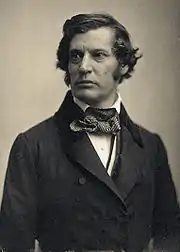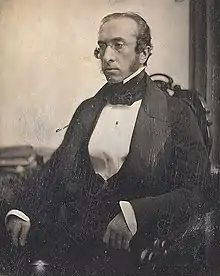1851 United States Senate election in Massachusetts
The 1851 United States Senate election in Massachusetts was held during January 1851. Free Soil Party candidate Charles Sumner was elected by a coalition of Free-Soil and Democratic legislators over Whig incumbent Robert C. Winthrop, who had been appointed to finish the term of retiring Senator Daniel Webster.
| |||||||||||||||||||||||
40 members of the Massachusetts Senate 396 members of the Massachusetts House Majority vote of each house needed to win | |||||||||||||||||||||||
|---|---|---|---|---|---|---|---|---|---|---|---|---|---|---|---|---|---|---|---|---|---|---|---|
| |||||||||||||||||||||||
| |||||||||||||||||||||||
At the time, Massachusetts elected United States Senators by a majority vote of each separate house of the Massachusetts General Court, the House and the Senate.
Background
At the time, Massachusetts elected governors by a majority of the popular vote. If no candidate received a majority, the election was decided by a vote of the General Court.
In 1850, the Massachusetts electorate split between three major parties: the Whigs, the Democrats, and the anti-slavery Free Soil Party. To overcome the much larger Whig Party, the Democrats and Free-Soilers entered a coalition to deprive the Whigs of a majority.
Under their power-sharing agreement, the state Democratic Party adopted an anti-slavery platform. Democrats George S. Boutwell and Nathaniel Prentiss Banks would be elected Governor and Speaker of the House, respectively. Free Soil leader Henry Wilson was elected Senate President. Finally, abolitionist activist Charles Sumner would be elected to the United States Senate in the January election.
In the 1850 legislative elections, the state was split between three major parties: Whigs, Democrats, and Free-Soilers. In the Senate, 14 Whigs, 14 Democrats, and 12 Free-Soilers were elected. In the House, 175 Whigs, 108 Democrats, and 113 Free-Soilers were elected.[1]
Although the Democratic-Free Soil coalition held a clear majority in each house, some Democratic legislators voiced their opposition to the election of the radical abolitionist Sumner. Conservative representatives who sought reconciliation with the South feared that Sumner's election would be a step toward civil war and sought to deny him the majority in the House.
Election in the House
The election for Senator began in the House on January 14, but the House adjourned after no candidate received a majority on the first two ballots.[2]
First ballot
| Party | Candidate | Votes | % | |
|---|---|---|---|---|
| Free Soil | Charles Sumner | 186 | 48.81% | |
| Whig | Robert C. Winthrop | 167 | 45.01% | |
| Democratic | Henry H. Childs | 6 | 1.57% | |
| Whig | Pliny Merrick | 5 | 1.31% | |
| Democratic | Isaac Davis | 5 | 1.31% | |
| Democratic | Robert Rantoul Jr. | 4 | 1.05% | |
| Democratic | George S. Boutwell | 2 | 0.52% | |
| Free Soil | Stephen C. Phillips | 2 | 0.52% | |
| Democratic | Benjamin F. Hallett | 1 | 0.26% | |
| Whig | George N. Briggs | 1 | 0.26% | |
| Free Soil | Samuel Hoar | 1 | 0.26% | |
| Unknown | John Mills | 1 | 0.26% | |
| Total votes | 381 | 100.00% | ||
Following the first ballot, a motion was made to postpone the election until February 15. Pending that motion, another motion was made to adjourn. The motion to adjourn failed 180-190, and the motion to postpone failed 159-193. The House proceeded to a second ballot.[2]
Second ballot
| Party | Candidate | Votes | % | |
|---|---|---|---|---|
| Free Soil | Charles Sumner | 186 | 48.56% | |
| Whig | Robert C. Winthrop | 168 | 43.86% | |
| Democratic | Robert Rantoul Jr. | 8 | 2.09% | |
| None | Blank votes | 4 | 1.04% | |
| Various | Scattering | 17 | 4.44% | |
| Total votes | 383 | 100.00% | ||
Following the failure of the second ballot, the House adjourned for the day. They also adjourned on January 15 without electing a Senator. Following this adjournment, the House Free Soilers threatened that if Sumner was not elected on the next ballot, then they would request the resignation of Democratic Governor George S. Boutwell, who owed his seat to the coalition's support.
Fifth ballot
| Party | Candidate | Votes | % | |
|---|---|---|---|---|
| Free Soil | Charles Sumner | 185 | 48.43% | |
| Whig | Robert C. Winthrop | 169 | 44.24% | |
| Various | Scattering | 25 | 6.54% | |
| None | Blank votes | 3 | 0.79% | |
| Total votes | 382 | 100.00% | ||
Sixth ballot
| Party | Candidate | Votes | % | |
|---|---|---|---|---|
| Free Soil | Charles Sumner | 187 | 48.95% | |
| Whig | Robert C. Winthrop | 169 | 44.24% | |
| Various | Scattering | 26 | 6.81% | |
| None | Blank votes | 3 | 0.79% | |
| Total votes | 382 | 100.00% | ||
Seventh ballot
| Party | Candidate | Votes | % | |
|---|---|---|---|---|
| Free Soil | Charles Sumner | 188 | 49.21% | |
| Whig | Robert C. Winthrop | 168 | 43.98% | |
| Various | Scattering | 26 | 6.81% | |
| None | Blank votes | 1 | 0.26% | |
| Total votes | 382 | 100.00% | ||
Twentieth and twenty-first ballots
On the twentieth ballot, April 23, Sumner was found to be one vote shy of a majority. However, a single vote had Sumner's name written but crossed out in pencil. After debate, this vote was counted and it was reported that Sumner had a one-vote majority,[5] but a Whig member of the House moved to count a previously-discarded vote as "scattering." After another half hour of debate, the motion carried without opposition and Sumner's majority was erased. It was reported that there were two more votes than members voting.[6]
After it was erroneously reported that Sumner had won by one vote, abolitionists throughout the Commonwealth began celebrating.[6]
| Party | Candidate | Votes | % | |
|---|---|---|---|---|
| Free Soil | Charles Sumner | 194 | 50.00% | |
| Whig | Robert C. Winthrop | 167 | 43.04% | |
| Various | Scattering | 27 | 6.96% | |
| Total votes | 388 | 100.00% | ||
Twenty-second ballot
| Party | Candidate | Votes | % | |
|---|---|---|---|---|
| Free Soil | Charles Sumner | 193 | 50.00% | |
| Whig | Robert C. Winthrop | 166 | 43.01% | |
| Various | Scattering | 27 | 6.99% | |
| Total votes | 386 | 100.00% | ||
Twenty-third ballot
On the twenty-third ballot, Sumner fell two votes short of a majority. It was reported that two votes for Sumner found "doubled together" were thrown out.[6]
| Party | Candidate | Votes | % | |
|---|---|---|---|---|
| Free Soil | Charles Sumner | 191 | 49.74% | |
| Whig | Robert C. Winthrop | 166 | 43.22% | |
| Various | Scattering | 27 | 7.03% | |
| Total votes | 384 | 100.00% | ||
Twenty-sixth and final ballot
On the twenty-sixth ballot, it was moved that votes be cast by envelope. Two Whigs were reported to have supported Sumner, one being Nathaniel B. Borden after instructions to do so from his constituents.[1] Sumner was declared the victor with a majority of one. Two blank ballots were not counted.[7]
| Party | Candidate | Votes | % | |
|---|---|---|---|---|
| Free Soil | Charles Sumner | 193 | 50.26% | |
| Whig | Robert C. Winthrop | 166 | 43.23% | |
| Democratic | Henry W. Bishop | 11 | 2.86% | |
| Free Soil | Stephen C. Phillips | 4 | 1.04% | |
| Democratic | Caleb Cushing | 3 | 0.78% | |
| Democratic | Isaac Davis | 3 | 0.78% | |
| Democratic | Henry H. Childs | 1 | 0.26% | |
| Democratic | Benjamin F. Hallett | 1 | 0.26% | |
| Democratic | Nathaniel Banks | 1 | 0.26% | |
| Total votes | 384 | 100.00% | ||
Election in the Senate
On January 20, between the fifth and sixth House ballots, Sumner was victorious over Winthrop in the Senate, receiving three votes more than the necessary 20.[8][9]
Votes for Sumner: Austin, Joseph T. Buckingham, Cazneau, Dean, Dewitt, Graves, Whiting Griswold, Howe, Kimball, Keyes, Morrison, Mosely, Robinson, Saunders Jr., Tabor, Usher, Welch, Whitney, Warner, Wellington, Wood, Senate President Wood, and Henry Wilson.
Votes for Winthrop: Barney, Bassett, Boynton, Daniels, Hyde, Charles Hubbard, Hawley, Hilliard, Kuhn, Newell, Russell, Sears, Benjamin Seaver, Wilkins
Vote for Bishop: Beach
| Party | Candidate | Votes | % | |
|---|---|---|---|---|
| Free Soil | Charles Sumner | 23 | 60.53% | |
| Whig | Robert C. Winthrop | 14 | 36.84% | |
| Democratic | Henry W. Bishop | 1 | 2.63% | |
| Total votes | 38 | 100.00% | ||
References
- "Our Boston Correspondence". Detroit Free Press. 5 May 1851. p. 2.
- "Massachusetts U.S. Senator". The Baltimore Sun. 16 Jan 1851. p. 2.
- "POLITICAL TREACHERY". The Liberator. Vol. 21 no. 3. 17 Jan 1851. p. 11.
- "THE ELECTION FOR SENATOR IN MASSACHUSETTS--MR. SUMNER". National Era. Vol. V no. 5. 30 Jan 1851. p. 18.
- "Ocean and Empire State". The Detroit Free Press. 25 April 1851. p. 3.
- "The Senatorial Election in Massachusetts". The New York Daily Tribune. 24 April 1851. p. 4.
- "CHARLES SUMNER ELECTED UNITED STATES SENATOR FROM MASSACHUSETTS". National Era. Vol. V no. 18. 1 May 1851. p. 70.
- "The Legislature--Election of Charles Sumner U. S. Senator on the part of the Senate". The Boston Herald. 22 Jan 1851. p. 4.
- "U. S. SENATOR". The Liberator. Vol. 21 no. 4. 24 Jan 1851. p. 15.

